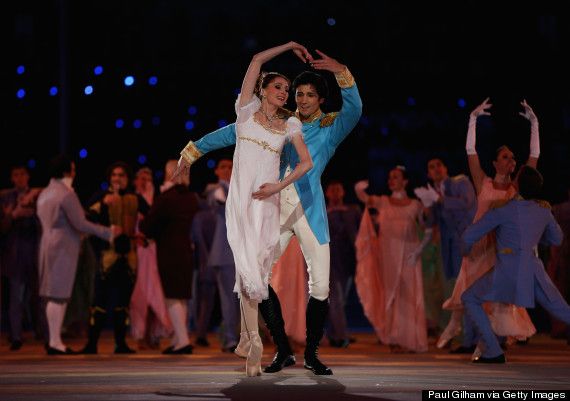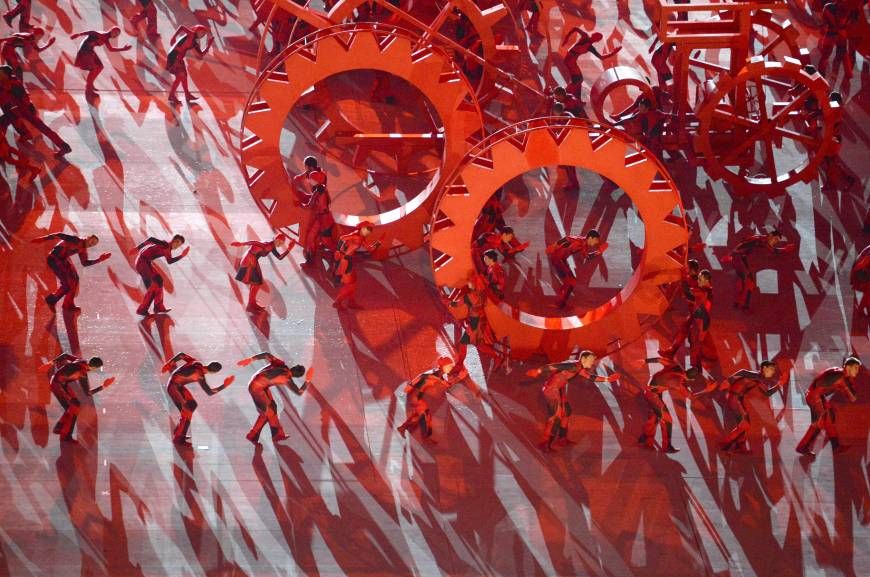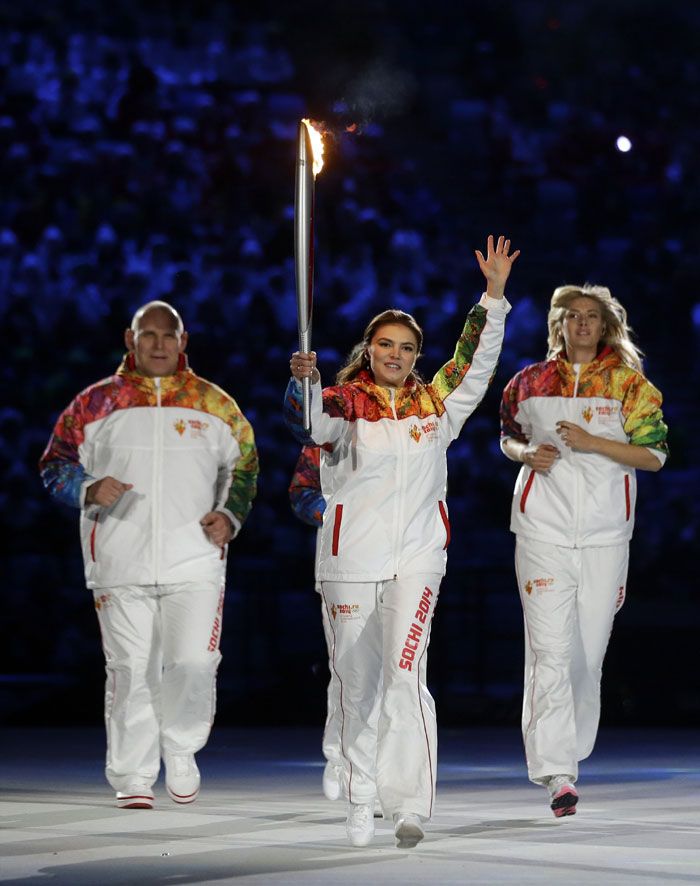Sochi: Stunning Display of Cultural Confidence… For Some Reason
In the best Soviet tradition, Russians couldn’t help exaggerating.
I generally dislike Olympic ceremonies because, staged on immense stadiums with numerous extras, they lend themselves easily to a totalitarian aesthetic. The 1980 Olympic opening ceremony in Moscow was an exercise in totalitarianism: pyramids of humans erected on the stadium, extras marching lockstep, etc. Likewise, the 2008 Beijing Olympics showcased loyal subjects moving around on cue.
Russians learned their lessons and sought to wow foreigners in Sochi through high art and high tech. Producer Andrei Boltenko was faced with the uneasy task of presenting the authoritarian extravaganza that is Russian history in some kind of truthful but positive light, and he did it through celebrating culture, not politics. Cue the cuckoo clock speech.
Russians opened up the program with a walk through the Cyrillic alphabet that highlighted Russia’s contributions to civilization. A quaint idea that a bunch of white men (save for Pushkin, and Russians don’t dwell too much on him being part black), most of them dead, did something worth treasuring.
I thought the list of great Russians was a bit heavy on emigres: Nabokov, Chagall, Kandinsky. I’m not sure Kandinsky belongs to that short list anyway — personal opinion, I know. Considering that Russia nurtured so many chess champions, maybe the producers could had Kasparov stand for the letter K. OK, never mind.
In the best Soviet tradition, Russians couldn’t help exaggerating. For letter T, for instance, they had “television”. While the word is Russian in origin, Russians (and Russian emigres) only invented some of the technology that went into it.
The story of Russia began with a carnival in medieval Moscow. They could have started it in Kiev, now the Ukrainian capital, because the city was the capital of Rus prior to Tartar invasion. The ceremony was in production long before the current unrest in Ukraine, so, I guess, the producers had time to change the show. I thought it was interesting that NBC dared to close up on Putin’s smug face during Ukraine’s entrance in the parade of the nations.
The most cringe-inducing NBC commentary came during the reenactment of the iconic Russian literature scene, Natasha Rostova’s first ball, from War and Peace. NBC anchors opined that the opulence of Imperial Russia produced reaction against Westernizers like Peter the Great and “reaction against the West”.
As it happens, Leo Tolstoy imagined War and Peace as a novel about the Decembrists. The Decembrists were the first generation of Russian revolutionaries who, like Tolstoy, were firmly on the side of the Russian peasants and believed that Russia has its own unique pass. They were, however, inspired by the Enlightenment, and by what they witnessed on their march through Europe during Napoleonic wars; they dreamed of a constitutional reform, abolition of serfdom and absolutism and ending Russia’s “backwardness”. In other words, they were Russian classic liberals. So, dear NBC, spare us your American self-flagellation.
American choreographer Daniel Ezralow was assigned the Soviet history portion of the production — smart move, Vlad! The Bolshevik revolution was set to the theme from the Soviet news program called Time Forward. NBC informed us that if Soviets wanted their propaganda, this is what they’d tune in to. It’s hard to imagine (and Bob Costas and his likes are not terribly imaginative) that, short of the jammed foreign radio, we had no sources of news. The government exercised near total control of the airwaves. By the way, did you hear about Russia moving to close an independent TV channel late January?
I thought Ezralow masterfully conveyed the atmosphere of totalitarianism. The masses of dancers were performing identical moves were supposed to show the loss of individuality in Soviet Union. With looming geometrical shapes, indistinguishable extras and the propaganda music, the segment represented the triumph of political over personal. (Why are some in the West so happy to declare that personal is political?)
Many in the media complained that there was nary a mention of Stalin in the ceremony. What they failed to note were the multiple red wheels rolled on the arena during the revolutionary section. “The Red Wheel” is a novel by Alexander Solzhenitsyn, Stalinism’s best-known accuser. So while the dictator did not make a personal appearance, he was alluded to. I give Putin a pass on that one.
A few days ago, the Christian Science Monitor opined:
If Putin is indeed correct and his country is emerging into a New Russia, then it is doing so precisely because it is evolving out of its Soviet past.In London, the opening sequence of the opening ceremony gave the world a glimpse of the post-imperial world, when a former world superpower looked back on its legacy and accepted it, both good and bad. That is the New Britain, and director Danny Boyle hit the world over the head with it from the start.
Au contraire. In Britain, Danny Boyle looked at Britain, superficially, and figured that all he cared for was the obligatory Shakespeare and a night of clubbing. Russia wants the world to know that it accepts all of its history, and that it learned its lessons. I don’t think the English-speaking world, having rid itself of its own cannon, understood their cultural references, and, in any event, by now we know better than to trust Putin.
The last portion of the history sequence was muddled, to be sure. Yes, there was that Soviet nostalgia, but it was set, ostensibly, in the youth culture of Khrushchev’s Thaw. That’s the period for which my parents’ generation had been nostalgic through the Brezhnev’s “stagnation”, and which was a contributing factor to the eventual downfall of the Soviet Union.
One of the central propositions of Soviet nostalgia is that the best childhood was in the post-World War 2 Soviet Union, and we saw that in the ceremony.
Strange, but I remember my baby teeth drilled and pulled without anesthesia, sadistic teachers, slave labor, flashers lurking in archways, almost good children’s movies and all sorts of miscellaneous anxieties. Those giant, creepy hammer and cycles that appeared in the midst of the post-WW2 section, they seem about right to me. And, I’m sure, they were intended to be creepy, intended to tell us that as ordinary people in the Soviet Union tried to live their lives, communism was hovering over them.
Putin revealed his sour spot when he ended the celebration of Russian art, ballet and literature with a desperate plea for more babies. These post-WW2 years were time of Soviet baby boom, with the total fertility rate reaching nearly 3 babies per woman. What Russians are not telling us is that in 1955 the Soviet Union legalized abortion, the morbid practice for which Russia remains notorious. In 1965, the country registered 5.5 million abortions per 2 million births — and that’s just the official number.
Oddly enough, within a few minutes from the fertility appeal, the world was introduced to Alina Kabaeva, Putin’s hot, accomplished baby-mama. One would think that a strongman who wants his subjects to produce more children would try to strengthen the institution of family; apparently not so in Russia.
The oddest part of the ceremony was the “white dove” segment, which Russians decided to set to the dark, moody music of Tchaikovsky Swan Lake. I was expecting that, in line with the ballet’s libretto, the dove will fall prey to an evil sorcerer. Now, who would that evil sorcerer be?
Russians do not shy away from touting homosexual Tchaikovsky or soft-core lesbian porn t.a.T.u. The contradictions between their tastes and their policies towards sexual minorities do not bother them. They like what they like, and that is that. To be sure, too many of them prefer the latter, but what really matters, however, is that the intelligentsia is willing to preserve its traditions and can showcase them when times calls for it.
Then there was that snowflake that failed to transform into an Olympic ring. Russians are not known for mastery of cutting edge technology (the ones who are had long ago made it to Seattle). There is the infrastructure that’s half-built, hastily euthanized stray dogs and other third world issues. That’s just the tip of the iceberg; the real story of the making of Sochi Olympics is corruption and human rights violations. But they can put their best foot forward when it comes to ballet. Russians certainly know how to throw dust in the eyes.
The Beijing opening ceremony warned the world that China has a 1 million-strong army and their soldiers are obedient. The show in London was a hot hipster mess. Russians laid a stake at being more sophisticated than everyone else — and they also told us that their nation is dying.
(Featured Image Source: YouTube)
 DONATE
DONATE
Donations tax deductible
to the full extent allowed by law.











Comments
“A quaint idea that a bunch of white men (save for Pushkin, and Russians don’t dwell too much on him being part black), most of them dead, did something worth treasuring.”
Are you kidding me?
If this is meant to be sarcasm it misses the mark.
If it’s meant as a true reflection on your belief system you’re on the wrong blog.
After some optimism a few years back and an increased birth rate, most of Russia’s young people again want to emigrate.
A friend went to Russia with the Peace Corps during the Clinton years an married a Russian. He’s been Russophile until recently, when he washed his hands and his portfolio of the Russian economy. Russian business learned how to survive in the Putin kleptocracy, but in recent years Putin has added way too much uncertainty as he uses trade to try to punish foreign enemies. The concept that buyers want a stable source of supply eludes him. So does the idea that many Russian businesses using just-in-time inventories will be forced to shut down if the border to a trading partner is suddenly closed by fiat.
Your irony meter may need recalibration.
Russia’s GDP is 10-15% of the USA’s or EU’s.
Wait until/unless China catches up and surpasses us. Cultural confidence? You ain’t seen nothin’ yet.
If a chauvinist China continues to rise & I’m still around and reasonably solvent, it will be (bitterly) amusing to observe how the multiculti Left reacts to Han contempt.
(Yes, I know that much or most of China’s growth might be chimerical. The key word is “might”. Rapid economic growth can be messy. [For example, a lot of people lost money during the Internet bubble, but the Internet was & remains transformational just the same.])
” it will be (bitterly) amusing to observe how the multiculti Left reacts to Han contempt.”
For decades, the multiculti left has taught that people of European stock are the only people who could possibly be racist or culturally arrogant, and also the only people who are fully responsible for their own situation and for the hardships of others as well. For the multiculti left, what other people and other cultures do is largely a response to what white people have done to them first.
Obviously it’s a terribly condescending view, which leftists wrap in the guise of tolerance. It’s also a terribly naive view, which leftists imagine to be sophisticated.
This mix of condescension and naivety gussied up as broadmindedness is behind the unwillingness to see Islam as a virulent force with a long history of aggression and a huge capacity to cause suffering and subject others to its agenda. After all, Muslims are mostly of non-European origin, so they can’t really have power over us, right?
The attitude toward China is similar. White leftists have to ignore many centuries of Chinese power and cultural arrogance, and ignore all evidence of persistent Chinese racism and chauvinism, in order to keep imagining that only white Europeans could actually have the capacity to alter other people’s destiny, and therefore the only reason to see any other group as a threat is racism, which purportedly is a congenital defect of the white race but a handful of leftist intellectualoids have managed to cure themselves of it.
Why the Hating on Russia?
http://www.noquarterusa.net/blog/76843/why-the-hating-on-russia/#more-76843
This is a very selective reading of Russian history. Putin is crashing dissent in the est tradition of his predecessors. There was a great article at National Review here:
https://www.nationalreview.com/nrd/articles/367982/vlad-conservative
If you read Russian, I highly recommend this essay by Yuri Nesterenko:
http://yun.complife.ru/miscell/exodus.htm
Did anyone seen Edward Snowden in the crowd ala “Where’s Waldo?”
Or Gérard Depardieu with a bottle of Stoli and some beluga caviar?
Let’s give Putin a break. I decided to google Alina Kabaeva’s image and found this:
http://larussophobe.files.wordpress.com/2009/12/kabaevareuters_450x300.jpg
Can anyone blame him for choosing her as his baby-mama?
Alina is a member of the Duma plus formerly a multi world & Olympic champ .
What I am not getting is the use of the term’ baby momma’ . To my knowledge there are no children involved even if there is a relationship . Why impose an american black slang on Russians ?
Edge – I think you were having some Stoli .
But really it is a such a deep & wide history with everything from Vikings to the Mongols to the siege of Leningrad. The USSR Era was great & a reminder of a distinctive art form . These shows are art not politics & I liked it a lot . I think it was different watching it live rather than having 6 hours of propaganda thrown at you before the delayed showing as in the US.
Our Telecast is conveying a completely different take than the USA’s . We are using our own commentators not nbc hacks .( the official camera feeds are excellent .)
Ps I have often wondered of Napoleon would have been good or bad. He certainly brought Germany out of its Feudalism by allowing subjects to buy their land & freedoms fro upper serfdom.( it took 2-3 generations ) . But I think he had passed his peak .
There is already one child and a rumored second one on the way.
She is not the only famous Russian gymnast to be have a private child. When Sveta Khorkina was asked who the father was , she implied – well it certainly ain’t a loser. ( words to that effect ) .
But we really don’t know & won’t be able to tell from pics. She is a Tartar & Putin is pretty mainstream Russian .
It is a compliment to Vlad to be thought virile enough for an exotic beauty. Look what Obama ‘s got .the only other name on the scene is Reggie Love.
Unwed motherhood is a huge problem in Russia. Many Russian women would very much like to have 2 or even 3 children, but at the end feel lucky to have just one. A lot of it has to do with single motherhood and divorce.
The paper that reported on Putin/Kabaeva wedding was closed down:
http://dailyentertainmentnews.com/breaking-news/alina-kabaeva-vladimir-putins-new-girlfriend/
NBC commented during the ceremony that she’s “romantically linked” to Putin. They were probably reading Putin’s script.
I’d like to have a vodka with Vlad. Or two or three.
I really liked the opening ceremonies. A history of the US told in a similar manner would likely gloss over slavery, the civil rights movement, ww2 internment, McCarthyism, etc. in a similar manner to how the Russians glossed over Communism.
It was a stylized and romanticized telling of Russian history. Nothing more, nothing less. the art was interesting and music was good. They could have not used the music of TATU, but it’s hard to find another pop music band that has the same recognition to an international audience.